Halo aims to launch driverless car service in Las Vegas
Halo plans to begin offering its first driverless car service to customers in Las Vegas later this year.
The autonomous vehicle startup’s cars will run on T-Mobile’s 5G network. The car service will initially be available “in urban parts of the Las Vegas Valley,” according to a news release from Halo.
Although Halo cars will not have a driver, they are not fully autonomous. Remote drivers will control Halo cars using proprietary technology. The cars feature nine cameras that feed video to a remote “pilot,” who operates the vehicle. Autonomous car technology such as radar and ultrasonic sensors will serve as backup for the remote driver.
But once passengers get in the car, they take over the steering wheel, as they would in a regular rental car. Once the user gets to their destination, the Halo car reverts back to remote mode and drives away.
“It’s like a normal car, you just drive it to wherever you want to go, and once you get there, simply hop off and walk away,” said Anand Nandakumar, the founder and CEO of Halo.
Taking a seat inside a fully autonomous vehicle can be, understandably, scary to many people. Nandakumar said he’s trying to bridge the gap between the human-driven car present and an entirely autonomous future.
“Full autonomy is a massive challenge from both a technical and social trust perspective that won’t be solved for years to come,” Nandakumar said in a press release. “But Halo has been designed to address these challenges by building automation over time starting with a solution that consumers will feel comfortable using today.”
The company aims to “replace the need for thousands of personally owned cars” and create “a more traffic-free, carbon-free, blue-sky world,” the press release states. Nandakumar foresees Halo “expanding into suburban areas of Las Vegas” but right now is focused on the city’s urban areas.
The company has received “strong interest from other cities in the U.S.” but is committed to making Las Vegas a success first, Nandakumar said.
Halo is aiming to appeal to visitors and residents alike, he added.
“Our mission is to make mobility affordable to all. In Las Vegas we will be starting off with tourists and locals in a geofenced region,” Nandakumar told the Review Journal on Thursday.
Clark County Commissioner Justin Jones, who is also vice chair of the Southern Nevada Regional Transportation Commission, painted the collaboration as a boon for the future of transportation in the Las Vegas Valley.
“For years, Nevada has been a hub for innovation in autonomous vehicles and a leader in this space,” Jones said. “Halo and 5G technology offer an intelligent transition between where we are today and where we want to go in the coming years, giving residents and visitors a better, more energy-efficient way to move throughout this great city.”
Halo’s new driverless and autonomous vehicle program is one of several in Southern Nevada.
In January 2018, Lyft and Aptiv launched a driverless ride-hailing service in Las Vegas. Motional began testing fully autonomous vehicles in the city in late February. The Amazon-owned Zoox is also testing its vehicles in Las Vegas.
Contact Dylan Svoboda at dsvoboda@reviewjournal.com. Follow @dylanksvoboda on Twitter.


















